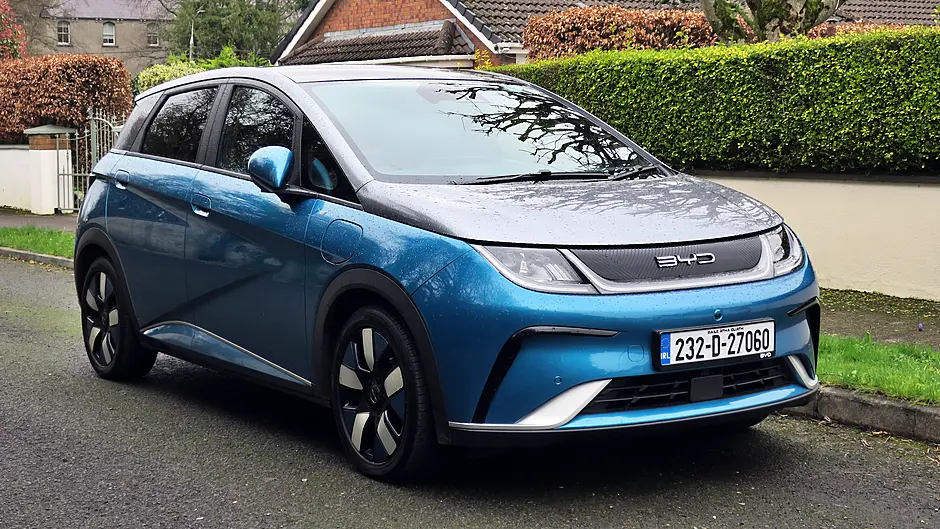BY BRIAN BYRNE
IT’S no secret that Chinese carmakers have their eyes very focused on the European electric cars market, which makes sense as the Euro-bloc is the key growth area for EVs outside China itself. So when BYD developed their compact segment Dolphin hatchback, they probably measured it for the ubiquitous Golf. Not difficult, as the BYD head designer Wolfgang Egger previously filled that position in VW’s Audi division.
So, in size, my review Dolphin was a familiar, easy fit. Against its EV competition, it also targets the Volkswagen ID.3. But it’s arguably more stylish, a stronger wedge shape accentuated by some contra-set character sculpting on the sides and with more punch to the front end
looks.

The rear is a mix of edgy and clean sheetmetal, the ‘Build Your Dreams’ slogan a bit less in your face than in the Atto 3 that was the first BYD here. If you were expecting any dodgy fit and finish, you’re going to be disappointed — the Dolphin is as well put together as any other good mass market carmaker offering. I wasn’t too sure of the grey and blue two toning in the review car, but that was just a personal aesthetic.
The blue was also evident inside, on a swooping dash, in leatherette on the steering wheel, doors trim and seats. Again, it wouldn’t be my choice, but real customers do get their colour options. The rear was roomy enough for three medium people and had plenty of headroom courtesy of the wedge shape, which also helped offer a decent cargo area.

I’ve noted before from BYD the Volkswagen ID influence in the driving instruments cluster, with easily assimilated information, and a bit more colour in the BYD’s graphics. The centre infotainment screen is quite massive, unnecessarily so, really. It has this rotating facility, so a choice of portrait of landscape. I liked the space underneath it for a phone, open and less likely for the device to be forgotten as you leave the car. The row of physical controls below that had the transmission selector on the driver end and the radio volume on the other. Main climate controls are via the screen.

The menu management in the screen had a more European feel than many Chinese offerings, though I still needed to delve a bit to switch off annoying sounds from the driver ‘assistance’ systems
As an EV, the performance was always going to be good, and the seven-second sprint to 100km/h is positively comparable to the 10.5s of a standard petrol Golf. While we’re comparing, the kerb weight of the Dolphin is about 22% heavier than that Golf, but clearly that isn’t a performance issue. I also felt that BYD have very well adapted suspension to minimise any sense of battery heaviness. Overall, the car offers a satisfying, even snappy drive.
The rated range of the Dolphin is 427km, but my experience was a realistic 400km, a figure backed up by the actual energy consumption of 15kWh/100km over typical commutes from country into city.
In February, one in five of battery electric vehicles sold in Europe were Chinese made.
The legacy major carmakers in Europe are concerned about this. If mass-market competition continues in the design and standard of the BYD Dolphin, they have reason.










